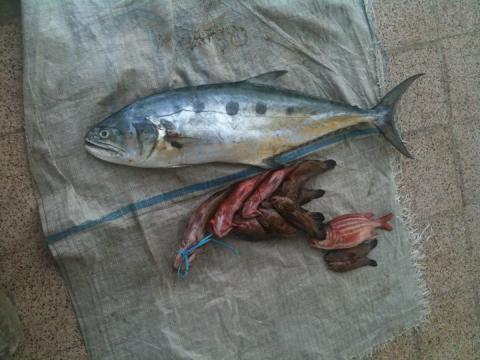Oman Diary: Catch of the day

Early morning at the small coastal town of Barka, 50 miles west of Oman's capital Mustcat. Since daybreak fishermen have been arriving in boats laden with the night's catch. They moor along the shore beside the fish market, known by locals as the souk. The traditional fishing boats - called huris - pitch and roll in the small waves; fisherman balance inside, dividing the catch into plastic crates and passing them to merchants. Crates are carried to the merchant's stall where the haggling with the punters begins.
(More pictures on our Facebook page here)
At the front of the souk, an elderly man commands the attention of an excited crowd. Resting on haunches, he auctions small lots of fish, controlling proceedings with the tap of a wooden rod. Punters encircle the low platform, scrutinising the lots. The dealer prods the fish, declaring the highest bid over and over. A bookkeeper beside him records transactions.
Throughout the souk, tiled stalls are marked in green Arabic numbering. Vendors specialise in one or two species - sprat, sardines, tuna and hammour are common. On the pavement by one stall lies a bull shark and scalloped hammerhead shark. A dozen or so smaller sharks (a metre or so in length) are set across a nearby counter.
At another stall, a group of four neatly-dressed Indian restaurateurs camly observe their interpreter haggle with a fishmonger. Migrant Indian labourers comprise a large section of the Omani workforce (more on this later). The interpreter consults with one of the Indian delegates; a tilt of the head and the deal is struck.
At the rear of the souk an older man fillets fish. He is covered in fish guts - not even his kumma (an Omani hat) is unscathed.
Fruit and vegetables are sold by women and younger men on the street adjacent to the souk. Omani women generally wear black abayas in public, but in Barka, their abayas are brightly coloured. Dates are in season during the summer - the lighter fresher dates are more expensive costing around 700 baisa (€1.50) a kilo.
Further along the beach, herds of cattle and goats await their fate in trucks. The nearby street is lined with butcher shops where whole carcasses are hung in the shop fronts.
Barka is situated about 50 miles West of Oman's capital Muscat on the Batinah coast. The Muscat to Sohar motorway leads to within a mile or two of the seafront. Roundabouts divide it into sections; each of these has a large monument in the centre surrounded by manicured gardens. Date palms and other trees line the motorway and more irrigated gardens decorate the central reservation.
